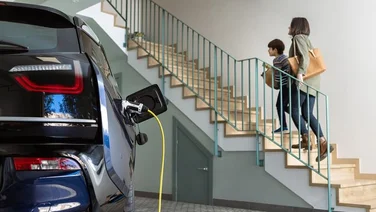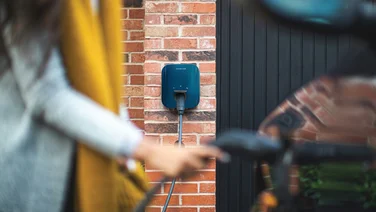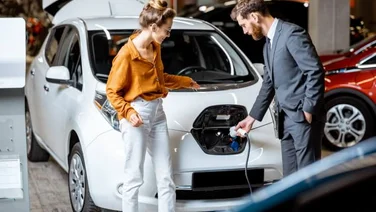We receive a small fee from trusted installers when you request a quote through our site. This helps us keep our content independent, well-researched and up to date – Learn more
- How do electric car batteries work?
- How long do electric car batteries last?
- Can electric car batteries be recycled?
- How many EVs are disposed of correctly?
- Can EV batteries be given a second life?
- Recycling for parts
- How are EV battery parts recycled?
- How to properly dispose of an EV battery
- How much does recycling an EV battery cost?
- The future of EV batteries
- EV battery recycling in the UK
- Summary
- There are more than 1.7 million fully electric cars on UK roads and a further 777,000 plug-in hybrids
- EV batteries last around 10 years, with some lasting up to 20 years
- Up to 95% of the battery’s elements can be recycled and used to make new EV batteries

Electric vehicles (EV) are more accessible than ever and the market is rapidly expanding. At the end of August 2025, there were more than 1.7 million fully electric cars on the road and more than 777,000 hybrids.
There were also 86,021 EV charging points across the UK, across 43,507 charging locations. This is a 47% year-on-year increase in the total number of charging devices, as recorded by Zap-Map.
Home installation costs have steadily declined, with the average cost between £500-£1,000 for a standard 7kW charger, and will help cut your recharging costs by £467 per year, compared to public chargers.
Although EVs are growing in popularity, there are still serious questions around their lifecycle, the biggest being: what happens to a dead EV battery once they’re no longer suitable?
As we’ll explain in more detail below, there are three main solutions: recycle, disposal or a second life.
How do electric car batteries work?
EV batteries are essentially a scaled up version of the lithium-ion battery in your mobile phone. They use a pack, which is made up of thousands of individual lithium-ion cells working together.
When you charge your EV, the electricity makes chemical changes inside the battery, and when you’re on the road, these changes are then reversed to help produce electricity.
Lithium-ion batteries have a higher energy density than lead-acid or nickel-cadmium rechargeable batteries, this means that manufacturers can save space by using smaller batteries in your EV. This also means you’re more likely to go further between charges because the car is lighter, as lithium – a critical mineral in green technology – is relatively light.
EV batteries made of lithium-ion are safer than most alternatives, and EVs are well-equipped with charging safeguards to help protect the batteries – especially during rapid charging sessions in a short period of time.
How long do electric car batteries last?
EV batteries last around 10 years, with some lasting up to 20 years. Some manufacturers say batteries need to be replaced every 100,000 miles, so the lifecycle can vary.
Fully-charged EV batteries can last between 150-400 miles between charges – a more than suitable distance for commuters and casual drivers. This depends on battery size, and the make and model of your EV.
If your battery deteriorates overtime or needs replacing, make sure you’re aware of your warranty before buying a new one.
Car manufacturer, MG, suggests these tips to try and increase your EV battery life:
- Charge the EV battery between 20%-80%. The lifespan of a battery pack often depends on how much it’s charged. MG says you can extend it by doing the above and trying not to let them drop below 50% too often
- Avoid overcharging. Over charging can cause chemical changes inside the battery life, according to MG, which could negatively affect how efficiently it can store energy. Ultimately, you are looking to reduce the number of charging cycles your battery goes through in its lifetime
- Reduce exposure to extreme temperatures. Extreme cold or heat can negatively impact your cat’s battery and therefore, the range you can travel
Can electric car batteries be recycled?
Electric car batteries can be recycled, but not many are.
On average, EV batteries degrade at a rate of 2.3% of maximum capacity per year, which means they won’t be suitable for an EV after about 10 years – or after the car has been driven for 100,000 miles.
However, like most cars and their tech, if you take care of the battery, you can reliably expect the battery to last as long or longer than most ICE (internal combustion engine – as found in traditional petrol or diesel cars) drivetrain components.
Once your EV battery comes to the end of its life, contact your local manufacturer’s garage. They can help recycle it and help you find a replacement. From here, the manufacturer has three main options: send the battery to landfill, give it a second life, or recycle the parts.
How many EVs are disposed of correctly?
A fairly dismal 5% of EV batteries around the world are currently recycled.
Unfortunately, disposal is a popular choice in the industry, which is wasteful and bad for the environment.
This is because chemicals leak into the topsoil and contaminate local ecosystems. By throwing an EV battery away, manufacturers also miss out on the higher profits and sales opportunities of reselling it for a different purpose.
Some manufacturers, however, decide to go down the disposal route if the battery is damaged or if they’re located in a region that lacks the necessary infrastructure to recycle, re-condition or re-sell the battery or its component parts.
Can EV batteries be given a second life?
Most manufacturers will give a used EV battery a second lease of life by reselling it for another purpose.
Although these batteries will no longer be suitable for EVs past 10-20 years, or 100,000 miles, they’ll still have around 75% of their original capacity remaining. This makes them a valuable resource for less-demanding activities.
A lot of used EV batteries are repurposed as solar storage batteries – energy-storage units to capture surplus solar energy.
By giving EV batteries this new lease of life, manufacturers can significantly reduce an EV’s negative impact on the environment, as it helps to reduce waste and limit the need to extract more resources. This also enables manufacturers to financially profit from the process – it’s a win-win.
Some major car manufacturers are working on their own repurposing projects to give their vehicles’ old batteries a new lease of life.
Recycling for parts
All good things come to an end, including electric car batteries, but the good news is up to 95% of the battery’s elements can be recycled and used to make new EV batteries.
To begin with, they are separated into parts. Once broken down, the manufacturer can start the mechanical and chemical separation process.
The process will depend on the type of battery, but generally, parts can be ground down to a fine powder in order to extract raw materials, such as lithium, nickel and manganese. The materials can then be used to rebuild more EV batteries.
How are EV battery parts recycled?
EV batteries can seem a bit complex. On the outside, you can see a battery pack, but on the inside sit dozens of modules that are home to hundreds of cells. These cells store and release electricity.
Inside each cell, lithium atoms move through an electrode (a solution) between a graphite anode (negative electrode) and a cathode (positive electrode).
Batteries are usually defined by the different types of metals that are in the cathode, which are usually either nickel-cobalt-aluminium, iron-phosphate, or nickel-manganese-cobalt.
When recycling batteries, manufacturers primarily target these metals in the cathode, as they’re usually worth more money than lithium and graphite.
Recyclers have two key methods of extracting valuable metals from the battery:
- Pyrometallurgy – This is the most-common method and it involves mechanically shredding the cell and then burning it, leaving recyclers with a pile of different types of plastic, metals and glues. At that point, they can use several methods to extract the metals, including further burning.
- Hydrometallurgy – Instead of burning the battery parts, this method involves dipping the battery materials into acid, which produces a pool of liquid metal

How to properly dispose of an EV battery
Most car companies with an EV range have introduced battery recycling schemes in recent years.
If your car’s battery has reached the end of its life, get in touch with your local manufacturer’s garage, who can help you recycle it and find a replacement.
Ford offers repairs and replaces EV batteries they can’t fix. They will then dispose of, recycle or reuse the battery.
It’s worth reaching out to local garages too, as many will be able to advise further on battery recycling and whether it’s a service they are offering.
Remember, because of the chemicals they contain, batteries can’t simply be thrown out, so be sure to dispose of them correctly.
How much does recycling an EV battery cost?
Updated regulations mean that UK EV manufacturers are expected to seek more recycled content.
There are now mandated minimum levels of recycled content for batteries, so at least 16% of cobalt, 6% of lithium and 6% of nickel must come from recycling, with these percentages rising to 26%, 12% and 15% respectively by 2036.
To achieve this, Innovate UK estimates that 150,000 tonnes of waste will need to be recycled every year by 2035, with battery cells using nickel or cobalt generally containing around £7/kg of value.
Patrick Curran, founder and CEO at Lithium Recycling Systems, suggests that 1 metric tonne of batteries will cost about £70 ($90) to process.
But once the metals have been separated, they can be sold – with ‘black mass’ (the mixture of nickel, manganese and cobalt oxides with carbon) selling for about £246 ($300) and metals selling for about £410 ($500).
As Recyclus co-founder and director Robin Brundle recently told the BBC: “With the ongoing global shift towards electrification, the accumulation of discarded batteries poses a significant challenge, underscoring the need for recycling initiatives”.
The location of recycling centres in strategic places could have a “massive impact on the industry” says Gavin Harper, Faraday Institution Research Fellow at the University of Birmingham.
Harper emphasises how important it is to: “configure this new industry in a way that will ensure its efficiency and sustainability for the long term”, pointing out that the UK is “lagging behind in the race, relative to the US and Europe and certainly China”.
The future of EV batteries
As manufacturers look to become more sustainable, more and more EV batteries are being recycled and given a chance for a second life.
It’s a path we need to take to reduce waste and reduce our impact on the planet.
But there’s still a long way to go before this becomes efficient – the costs need to come down and processes need to be simplified.
Thankfully, experts in the industry are already working on this.
Innovative UK’s report, The 2035 UK Battery Recycling Industry Vision: Sustainable thinking for the future, says there’s an opportunity to increase research and development into ensuring the battery value chain is as sustainable as possible – and that it’s consistent across manufacturers and countries.
“We can look into the physical and chemical separation. Green solvents, for example, can be utilised in the chemical separation of black mass into metal salts, which can be used in battery production,” the report states.
“This would enable the battery recycling industry to produce products with low embodied carbon and environmental impacts.
“These products can then be directed back into the battery materials supply chain to produce new batteries with recycled materials.”
EV battery recycling in the UK
UK garages are legally required to safely and responsibly recycle/dispose of EV batteries, but this has been quite a challenge as the number of EVs on the road rises.
Last year, however, they were given a solution when a new UK company started to collect the used lithium ion batteries for recycling back into battery manufacture.
Recyclus – based in Wolverhampton – can process 8,300 tonnes of spent EV batteries every year. It claims to separate the steel, aluminium and copper in them, with a core focus of harvesting the nickel, manganese, lithium and cobalt every EV battery contains.
This is a huge step in the right direction for EV battery recycling in helping to reduce high disposal rates.
It has been suggested that by 2030, there could be 11 million tonnes of spent lithium-ion batteries from all sources in need of recycling worldwide.
The firm plans to launch six battery recycling facilities within the next five years and is working with the University of Birmingham on the development of a mobile version of its recycling plant.
Summary
- EV batteries last around 10 years, with some lasting up to 20 years
- Fully-charged EV batteries can last between 150-400 miles between charges
- On average, EV batteries degrade at a rate of 2.3% of maximum capacity per year
- UK garages are legally required to safely and responsibly recycle/dispose of EV batteries, but this has been quite a challenge as the number of EVs on the road rises
- As manufacturers look to become more sustainable, more and more EV batteries are being recycled and given a chance for a second life








